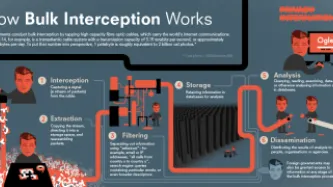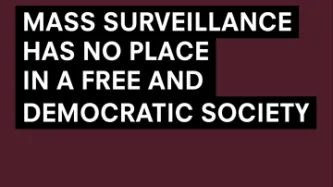Advanced Search
Content Type: News & Analysis
The UK government has acknowledged that section 8(4) of the Regulation of Investigatory Powers Act (“RIPA”) (which has since been repealed) violated Articles 8 and 10 of the European Convention on Human Rights (ECHR). In relation to Article 10, it specifically acknowledged that the way in which security agencies handled confidential journalistic material violated fundamental rights protected by Article 10.
As part of a friendly settlement with two applicants, the UK government acknowledged…
Content Type: Long Read
The Grand Chamber of the European Court of Human Rights ruled that the UK government’s historical mass interception program violates the rights to privacy and freedom of expression. The Court held that the program “did not contain sufficient “end-to-end” safeguards to provide adequate and effective guarantees against arbitrariness and the risk of abuse.” As a result the Court ruled that UK law "did not meet the “quality of law” requirement and was therefore incapable of keeping the “…
Content Type: Long Read
On 25 May 2021, the European Court of Human Rights issued its judgment in Big Brother Watch & Others v. the UK. Below, we answer some of the main questions relating to the case.
After our initial reaction, below we answer some of the main questions relating to the case.
NOTE: This post reflects our initial reaction to the judgment and may be updated.
What’s the ruling all about?
In a nutshell, one of the world’s most important courts, the Grand Chamber of the European Court of Human…
Content Type: Press release
The Grand Chamber of the European Court of Human Rights has today ruled that UK mass surveillance laws violate the rights to privacy and freedom of expression.It found that:The UK’s historical bulk interception regime violated the right to privacy protected by Article 8 of the European Convention on Human Rights and freedom of expression, protected by Article 10. Particularly it found that:the absence of independent authorisation,the failure to include the categories of selectors in the…
Content Type: Long Read
Six years after NSA contractor Edward Snowden leaked documents providing details about how states' mass surveillance programmes function, two states – the UK and South Africa – publicly admit using bulk interception capabilities.Both governments have been conducting bulk interception of internet traffic by tapping undersea fibre optic cables landing in the UK and South Africa respectively in secret for years.Both admissions came during and as a result of legal proceedings brought by Privacy…
Content Type: Long Read
This piece was originally published in Just Security.
Earlier this month, the European Court of Human Rights issued a major judgment in three consolidated cases challenging the U.K. government’s mass interception program, which was first revealed by Edward Snowden in 2013. That judgment finds notable deficiencies in the legal framework governing mass interception, rendering the program unlawful under Articles 8 and 10 of the European Convention on Human Rights (ECHR), which protect the rights…
Content Type: Long Read
Written jointly by Privacy International and the American Civil Liberties Union (ACLU).
In a landmark decision earlier this month, the European Court of Human Rights ruled that one of the mass surveillance programs revealed by Edward Snowden violates the rights to privacy and freedom of expression. While the case challenges the U.K. government’s mass interception of internet traffic transiting its borders, the court’s judgment has broader implications for mass spying programs in Europe and…
Content Type: Long Read
Yesterday, the European Court of Human Rights issued its judgement in Big Brother Watch & Others V. the UK. Below, we answer some of the main questions relating to the case.
What's the ruling all about?
In a nutshell, one of the world's most important courts, the European Court of Human Rights, yesterday found that certain UK laws about how intelligence agencies can spy on our internet communications breach our human rights. These surveillance laws have meant that the UK intelligence…
Content Type: Long Read
The European Court of Human Rights ruled today that the UK government's mass interception program violates the rights to privacy and freedom of expression. The Court held that the program "is incapable of keeping the 'interference' to what is 'necessary in a democratic society'". This finding is an important victory for human rights and the rule of law. Below, we break down the key parts of the decision.
The Court's ruling comes after a five-year battle against two UK mass surveillance…








